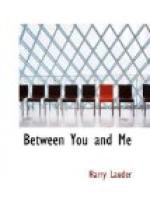SIR HARRY LAUDER
Author of “A Minstrel in France”
New York
The James A. McCANN company
1919
This book is dedicated to the Fathers and Mothers of the Boys who went and those who prepared to go.
“One of the boys who went”
Say, Mate, don’t you figure it’s great
To think, when the war is all over,
And we’re thro’ with the mud—
And the spilling of blood,
And we’re shipped back again to
old Dover;
When they’ve paid us our tin
And we’ve blown the lot in,
And our very last penny is spent,
We’ll still have a thought, if that’s
all we’ve got:
Well, I’m one of the boys who went.
Perhaps, later on, when the wild days are gone
And you’re settling down for life—
You’ve a girl in your eye, you’ll ask
bye and bye
To share up with you as your wife—
Then, when a few years have flown
And you’ve got “chicks” of your
own
And you’re happy, and snug, and
content,
Man, it will make your heart glad
When they boast of their Dad—
My Dad—He was one of the boys
who went.
BETWEEN YOU AND ME
CHAPTER I
It’s a bonny world, I’m tellin’ ye! It was worth saving, and saved it’s been, if only you and I and the rest of us that’s alive and fit to work and play and do our part will do as we should. I went around the world in yon days when there was war. I saw all manner of men. I saw them live, and fight, and dee. And now I’m back from the other side of the world again. And I’m tellin’ ye again that it’s a bonny world I’ve seen, but no so bonny a world as we maun make it—you and I. So let us speer a wee, and I’ll be trying to tell you what I think, and what I’ve seen.
There’ll be those going up and doon the land preaching against everything that is, and talking of all that should be. There’ll be others who’ll say that all is well, and that the man that wants to make a change is no better than Trotzky or a Hun. There’ll be those who’ll be wantin’ me to let a Soviet tell me what songs to sing to ye, and what the pattern of my kilts should be. But what have such folk to say to you and me, plain folk that we are, with our work to do, and the wife and the bairns to be thinkin’ of when it comes time to tak’ our ease and rest? Nothin’, I say, and I’ll e’en say it again and again before I’m done.
The day of the plain man has come again. The world belongs to us. We made it. It was plain men who fought the war—who deed and bled and suffered in France, and Gallipoli and everywhere where men went about the business of the war. And it’s plain men who have come home to Britain, and America, to Australia and Canada and all the other places that sent their sons out to fight for humanity. They maun fight for humanity still, for that fight is not won,—deed, and it’s no more than made a fair beginning.




